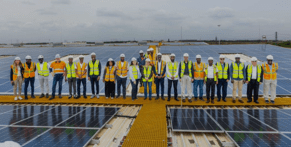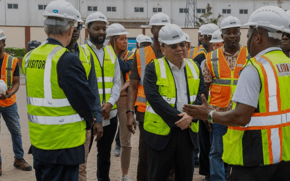…visits Africa’s largest rooftop solar project and flood mitigation works
By Buertey Francis BORYOR
Managing Director and Chief Administrative Officer of the World Bank, Mr. Wencai Zhang, has commended Ghana’s strides in renewable energy during a visit to Africa’s largest single solar rooftop project at Tema Port, on April 12, 2025.
The 16.82 MW installation, funded by the International Finance Corporation (IFC), underscores the country’s commitment to sustainable industrial growth and climate resilience.

The solar project, completed in 2024, powers businesses in the Tema Free Zone Enclave, reducing reliance on fossil fuels and cutting operational costs.
It is the third-largest rooftop solar facility globally, trailing only Apple Park- 17 MW and Tesla’s Gigafactory-70 MW.
During the tour, Mr. Zhang hailed the initiative as a “flagship example” of the World Bank Group’s partnership with the country. “This project demonstrates how renewable energy can drive economic competitiveness, lower emissions, and attract investment.

“The Bank would explore further collaborations to scale up Ghana’s renewable energy mix, including a planned 150 MW solar plant in Dawa, he said.
He stressed the role of such infrastructure in attracting investors, generating jobs, and supporting the country’s industrial diversification.
“We are proud to be part of this partnership. This is how the World Bank Group demonstrates its support- through impactful and innovative solutions that support governments and enable private sector growth,” he elaborated.

Adlai Opoku Boamah, Managing Director of LMI Utilities, a subsidiary of LMI Holdings, highlighted the project’s broader impact, noting that beyond providing clean energy, it enhances the green credentials of export-oriented businesses within the enclave.
He shared LMI’s vision to expand solar capacity to 1,000 MW by 2030, with continued support from the IFC.

Meanwhile, Minister for Energy and Green Transition, John Jinapor, speaking during the visit commended the IFC and LMI Holdings for their contribution to the country’s energy mix, describing the rooftop solar project as an “example worth replicating.”
“There is a strong value-for-money proposition here. I have inherited some solar projects whose costs are quite alarming, but this one proves that with the right partnerships, solar can be cost-effective,” the Minister said.
He expressed interest in learning more about the project’s cost structure and efficiency in distribution, highlighting the nation’s struggle with nearly 40 percent commercial losses in the electricity sector.
“If we can replicate your success model in Tema and beyond, we will significantly reduce losses and alleviate pressure on the national grid,” he said.
Mr. Jinapor also indicated that the government is considering the establishment of a Renewable Energy Authority and is rolling out the Renewable Energy Investment Fund, which seeks to reallocate a portion of fossil fuel revenues to support green energy initiatives.

One such initiative, he said, involves the deployment of solar-powered streetlights to reduce night-time energy consumption and smoothen peak electricity demand.
“Streetlights consume a lot of energy, and nobody pays for them. If we replace them with solar systems, we can plateau peak demand and reduce capacity charges,” the Minister explained.

As part of his tour, Mr. Zhang also inspected ongoing flood mitigation efforts under the Greater Accra Resilient and Integrated Development (GARID) Project.
Key interventions include the dredging of the Odaw Channel to improve drainage and restore the heavily polluted Korle Lagoon, as well as the construction of a new storm drain along the Nima-Paloma corridor to alleviate chronic flooding in one of the capital city’s most vulnerable communities.

The $150 million GARID initiative aims to protect 2.5 million residents in the Odaw Basin from climate-related disasters while improving urban infrastructure.

He finally visited the rehabilitated Kwame Nkrumah Memorial Park, a World Bank-supported project under the Ghana Tourism Development Program.

Mr. Zhang underscored the importance of preserving cultural heritage as part of sustainable development, noting how such sites contribute to economic growth through tourism.










